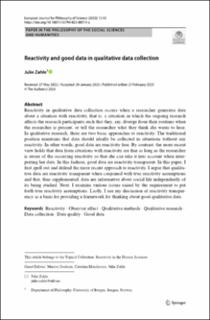| dc.contributor.author | Zahle, Julie | |
| dc.date.accessioned | 2023-05-19T11:26:59Z | |
| dc.date.available | 2023-05-19T11:26:59Z | |
| dc.date.created | 2023-05-16T09:53:06Z | |
| dc.date.issued | 2023 | |
| dc.identifier.issn | 1879-4912 | |
| dc.identifier.uri | https://hdl.handle.net/11250/3068345 | |
| dc.description.abstract | Reactivity in qualitative data collection occurs when a researcher generates data about a situation with reactivity, that is, a situation in which the ongoing research affects the research participants such that they, say, diverge from their routines when the researcher is present, or tell the researcher what they think she wants to hear. In qualitative research, there are two basic approaches to reactivity. The traditional position maintains that data should ideally be collected in situations without any reactivity. In other words, good data are reactivity free. By contrast, the more recent view holds that data from situations with reactivity are fine as long as the researcher is aware of the occurring reactivity so that she can take it into account when interpreting her data. In this fashion, good data are reactivity transparent. In this paper, I first spell out and defend the more recent approach to reactivity. I argue that qualitative data are reactivity transparent when conjoined with true reactivity assumptions and that, thus supplemented, data are informative about social life independently of its being studied. Next, I examine various issues raised by the requirement to put forth true reactivity assumptions. Lastly, I use my discussion of reactivity transparency as a basis for providing a framework for thinking about good qualitative data. | en_US |
| dc.language.iso | eng | en_US |
| dc.publisher | Springer | en_US |
| dc.rights | Navngivelse 4.0 Internasjonal | * |
| dc.rights.uri | http://creativecommons.org/licenses/by/4.0/deed.no | * |
| dc.title | Reactivity and Good Data in Qualitative Data Collection | en_US |
| dc.type | Journal article | en_US |
| dc.type | Peer reviewed | en_US |
| dc.description.version | publishedVersion | en_US |
| dc.rights.holder | Copyright 2023 the author | en_US |
| dc.source.articlenumber | 10 | en_US |
| cristin.ispublished | true | |
| cristin.fulltext | original | |
| cristin.qualitycode | 2 | |
| dc.identifier.doi | 10.1007/s13194-023-00514-z | |
| dc.identifier.cristin | 2147734 | |
| dc.source.journal | European Journal for Philosophy of Science | en_US |
| dc.identifier.citation | European Journal for Philosophy of Science. 2023, 13, 10. | en_US |
| dc.source.volume | 13 | en_US |

